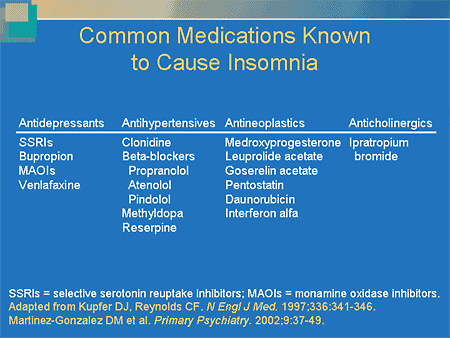

Exercise regularly and end exercise several hours before bedtime.Wake up and go to bed at the same time each day, even on weekends.The key to getting improving your sleep is practicing what is known as good sleep hygiene, including these habits: That can include napping during the day, if that fits into your life and helps you meet your sleep needs. Singh: Rather than taking sleep aids, people who are sleep-deprived should attempt to get more sleep and increase time spent in bed. Q: What can you do if you’re sleep-deprived, but don’t have a sleep disorder?ĭr. Therapy may also help reduce anxiety related to not sleeping.
#Insomnia medications how to
With this form of therapy, trained professionals teach you how to promote sleep and tackle insomnia issues, and the tools they provide can help enhance the quality of your sleep. Singh: The best way to address sleep issues is with cognitive behavioral therapy for insomnia, or CBTI. Q: How do people resolve insomnia over the long-term?ĭr. But sleeping pills are only a short-term fix (meaning six to 12 months). It’s important to determine why you’re not sleeping (or not sleeping well), and whether your issue will respond to medication. Singh: Sleeping pills are hugely important – but before you resort to taking them to get more shut-eye, you should see a sleep specialist and get a complete evaluation.

Here, Singh answers your most pressing questions about over-the-counter and prescription sleep aides.ĭr.

Instead, they’re a temporary treatment for people who suffer from insomnia, but are not effective for other sleep disorders, like narcolepsy and sleep apnea. Either way, these medications can offer tremendous relief to people who have trouble falling asleep or maintaining restorative sleep.”īut sleeping pills are not a permanent solution. For example, some anti-anxiety medications cause drowsiness. “Doctors prescribe sleeping pills designed to promote drowsiness, but they may also prescribe medication that are not targeting sleep, but still cause people to feel sleepy. “Sleeping pills work on our brains by increasing drowsiness,” explains Henry Ford sleep specialist Meeta Singh, M.D. In the long term, chronic sleep deprivation may lead to a host of health problems including obesity, diabetes, cardiovascular disease and even premature death. In the short term, insufficient sleep affects judgment, mood, ability to learn and retain information, and may increase the risk of serious accidents and injury. And more than one-third of Americans don’t get enough sleep on a regular basis, whether they have a diagnosed sleep disorder or not. According to the American Sleep Association, up to 70 million American adults suffer from some sort of sleep disorder.


 0 kommentar(er)
0 kommentar(er)
